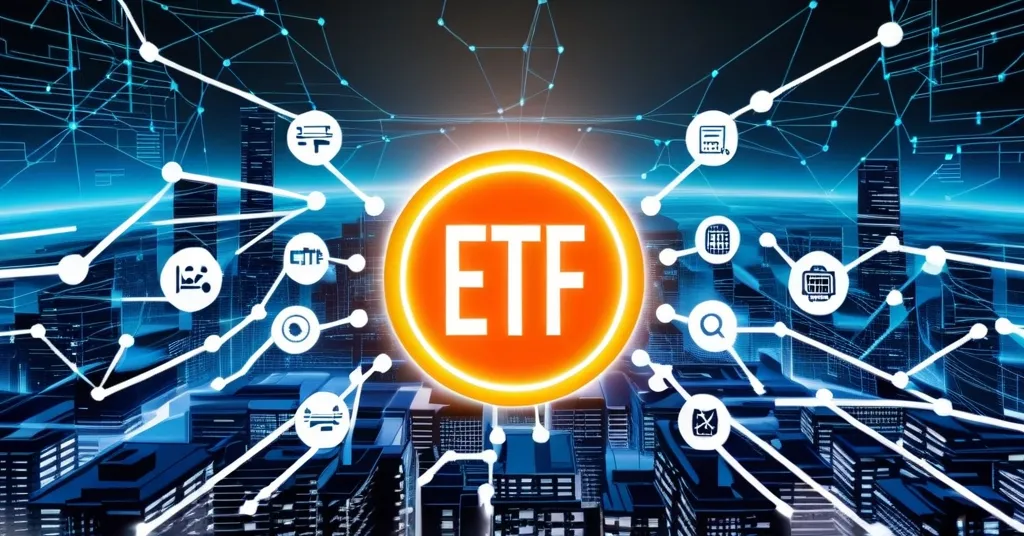VanEck’s NODE ETF: Investing in Digital Economy Without Direct Crypto Exposure

VanEck’s Onchain Economy ETF: A New Gateway to the Digital Asset World
VanEck filed a groundbreaking proposal with the U.S. Securities and Exchange Commission (SEC) on January 15, 2025, to launch the Onchain Economy ETF, aiming to provide investors with a new way to engage with the digital asset economy without directly investing in cryptocurrencies.
- VanEck’s Onchain Economy ETF (NODE) focuses on digital economy without direct crypto investment.
- ETF to invest in Digital Transformation Companies and Digital Asset Instruments.
- Surge in crypto-related ETFs from Bitwise, WisdomTree, Grayscale, and BlackRock.
- Bitcoin ETFs outpacing gold ETFs in growth.
VanEck isn’t just dipping their toes in the digital pond; they’re diving headfirst into the crypto pool without getting their hair wet! The Onchain Economy ETF, poised to trade under the ticker NODE, is a strategic foray into the digital asset economy. Unlike other funds that dive straight into cryptocurrencies like Bitcoin, this ETF focuses on the businesses and technologies that make the digital economy tick. With a commitment to invest at least 80% of its net assets in what they call “Digital Transformation Companies” and “Digital Asset Instruments,” it’s clear that VanEck is betting big on the infrastructure of the digital future.
“Digital Transformation Companies” include a wide array of businesses that are pivotal in the transition to digital assets. Think crypto exchanges like Coinbase, payment gateways like BitPay, mining operations like Marathon Digital Holdings, and the software and infrastructure providers that keep the digital world spinning. On the other hand, “Digital Asset Instruments” encompass the energy infrastructure, data centers, and other technologies that support the digital asset market. It’s like investing in the pickaxes and shovels during a gold rush, rather than the gold itself.
This move by VanEck comes at a time when the crypto market is buzzing with activity. Other financial giants like Bitwise, WisdomTree, Grayscale, and BlackRock are also jumping on the ETF bandwagon. Bitwise is pushing for a 10 Crypto Index Fund ETF that includes Bitcoin, Ethereum, Solana, and Cardano. WisdomTree is eyeing an XRP-related ETF, while Grayscale wants to convert its Solana Trust into an ETF. BlackRock, not to be outdone, is planning to launch a Bitcoin ETF in Canada. It’s a clear sign that the digital asset economy is no longer a fringe interest but a mainstream investment opportunity.
The meteoric rise of Bitcoin ETFs is particularly noteworthy. In just one year, they’ve managed to eclipse gold ETFs, amassing $107 billion in assets under management compared to gold’s $128 billion over two decades. This isn’t just a blip on the radar; it’s a testament to the mainstreaming of digital assets and a signal that the future of finance is increasingly digital.
Matthew Sigel, VanEck’s head of digital assets research, hinted at more to come, stating:
More information about the ETF would be disclosed in the coming weeks.
While the excitement around digital assets is palpable, it’s crucial to stay grounded. The Onchain Economy ETF’s decision to not directly invest in cryptocurrencies like Bitcoin is a strategic move, aiming to tap into the broader ecosystem rather than the volatile waters of direct crypto investment. This approach offers a more stable way to invest in the digital economy, but it also means missing out on the direct potential gains of the cryptocurrencies themselves.
As champions of decentralization, freedom, and privacy, we recognize that the path to financial revolution is paved with both innovation and caution. Bitcoin maximalists might scoff at not directly holding the king of cryptos, but even they must acknowledge the critical roles that altcoins and other blockchain technologies play in the broader financial landscape. This ETF, while not directly investing in Bitcoin, aligns with the concept of effective accelerationism, pushing the adoption of blockchain technology forward by supporting the companies and infrastructure that enable it.
So, where does this leave us?
Key Questions and Takeaways
What is the Onchain Economy ETF and its purpose?
The Onchain Economy ETF is a proposed investment product by VanEck aimed at providing investors with exposure to the digital asset economy. It focuses on companies and instruments that support digital asset transformation without directly investing in cryptocurrencies.
What are the main investment streams of the Onchain Economy ETF?
The ETF will invest in “Digital Transformation Companies” and “Digital Asset Instruments,” which include crypto exchanges, payment gateways, mining companies, and infrastructure providers.
Why does the Onchain Economy ETF not invest directly in cryptocurrencies like Bitcoin?
The ETF focuses on companies essential for the expansion of the digital currency industry rather than holding digital currencies directly, allowing for a broader investment approach within the digital asset ecosystem.
How does the filing of the Onchain Economy ETF fit into the broader trend of crypto-related ETFs?
The filing reflects a surge in interest in crypto-related ETFs, as other firms like Bitwise, WisdomTree, Grayscale, and BlackRock have also filed for various digital asset ETFs, indicating growing institutional interest and mainstream acceptance.
What does the growth of Bitcoin ETFs signify in comparison to gold ETFs?
The rapid growth of Bitcoin ETFs, reaching $107 billion in assets under management in one year, compared to gold ETFs’ $128 billion over 20 years, signifies the increasing mainstream acceptance and potential of digital assets as a viable investment class.
As we navigate this exciting yet unpredictable terrain, VanEck’s Onchain Economy ETF is a beacon of what’s possible in the digital asset world. It’s a reminder that while the allure of cryptocurrencies is strong, the real power might just lie in the infrastructure and companies that support them. And while we celebrate this step forward, let’s not forget the need for vigilance, as the path to decentralization and financial freedom is fraught with both promise and peril.



